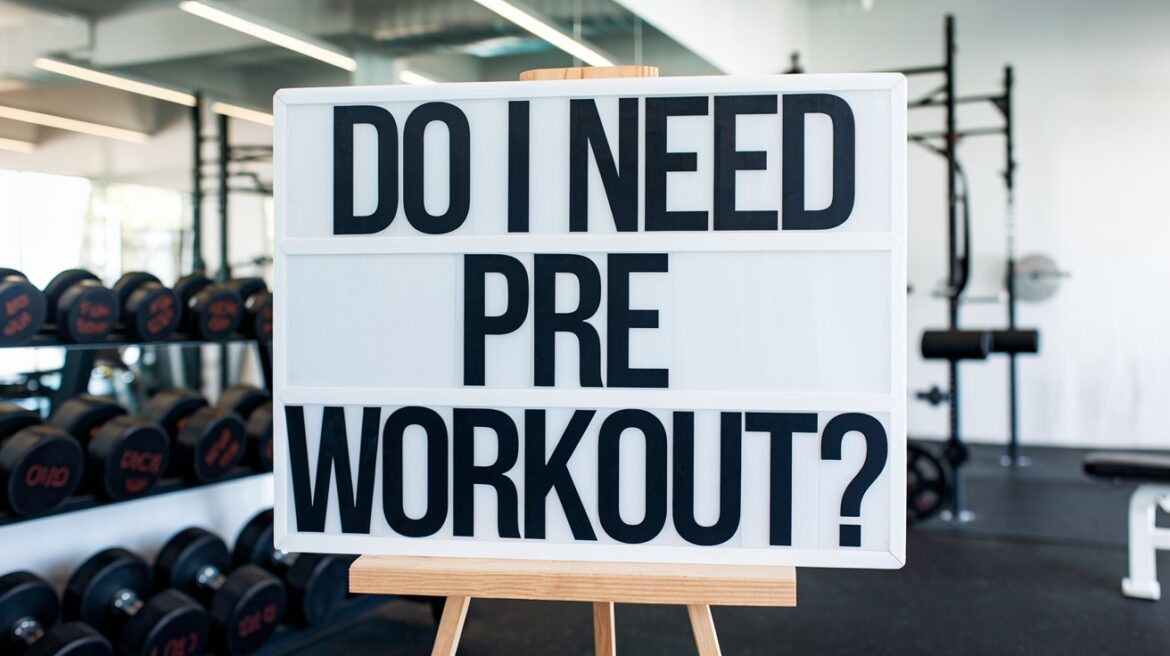Query Answer:
These supplements are not for everyone; they enhance performance during workouts, particularly in terms of energy and concentration, but increase endurance, which most people can attain with a proper diet, proper hydration, and much sleep.
Pre-workouts are most beneficial for people who carry out intense or long-duration exercise. Nevertheless, one must consider whether the benefits of taking pre-workout outweigh the risks-possible side effects-that could become dependence on stimulants such as caffeine.
Understanding Pre-workout Supplements
Pre-workout supplements are multi-ingredient preparations meant to assist exercise performance. Primarily, they consist of stimulants, amino acids, and other ergogenic aids that have the supposed purpose of potentiating energy, attention, and endurance for physical activity. Some of the most commonly used ingredients include caffeine, beta-alanine, and creatine as they stimulate or target different parts of physical performance.
Definition: These supplements are taken before exercise to enhance workout efficiency.
Common Ingredients:
Caffeine: Increases alertness and energizes
Beta-Alanine: Acts as an extra lactic acid buffer, delaying the build-up of fatigue in the muscle
Creatine: Plays the role of enhancing and stabilizing muscle strength and power
Do You Really Need Pre-workout? Factors to Consider
Energy Levels and Workout Intensity
Pre-workout supplements will aid the regular fatigued exerciser who lacks enough intensity or the sportsperson who finds himself engaged in extensive endurance sports, strength training activities, or high-intensity interval training as pre-workouts may be offering more energy and enhancing endurance.
Role of Diet and Sleep
Proper nutrition with proper sleep can help to maintain or increase energy during exercise. Right inputs in carbs, proteins, and healthy fats, with hydration, shall provide the body with enough energy in general without supplementary boosters. Moreover, appropriate and quality sleep is necessary in maintaining the natural energy levels of any individual.
Are There Alternatives?
Some may use other sources to introduce caffeine into their body rather than pre-workout supplements, such as coffee, which is more of a natural route. Even simple snacks like a banana or a protein shake were sufficient before the exercise to give the energy and nutrients to power through the exercise.
Advantages of Pre-Workout Supplements
Increased Energy and Concentration
Pre-workouts are replete with caffeine and other stimulants that will stimulate the central nervous system, enhance focus, reduce perceived exertion, and enable them to drive much more intensively when working out. This is very effective in those doing brain-intensive or high-stamina workouts.
Increased Stamina
Among other things, beta-alanine keeps the lactic acid buildup in the muscles from building up and delaying the onset of muscular tiredness. Athletes can maintain higher-intensity efforts for longer durations without reaching muscle failure nearly as rapidly.
Increased Muscle Strength
Creatine is probably the most extensively researched ergogenic aid, enhancing acute muscle strength by refilling ATP, the human body’s primary fuel for explosive movements. The result is the potential for increased strength and thus for performing more repetitions or lifting heavier weights in resistance exercise.
Under What Circumstances Pre-Workout May Not Be Needed Cost End
Well, some pre-workouts do come at quite a steep price tag, and some folks do not require them to be fit. Most people would find that a meal or snack an hour before exercise accomplishes a similar effect if furthered by proper hydration and rest.
Possible Adverse Reactions
Many common side effects of pre-workout supplements include jitteriness, increased heart rate, and tingling from beta-alanine. People sensitive to stimulants, particularly caffeine, may find these side effects unbearable or even toxic if taken in excess.
How to Choose a Pre-Workout Supplement
Reading the Label
One should select quality and safety tested third-party pre-workout supplements.Since many use proprietary mixes, it is impossible to determine the exact amount of any component in a supplement. Caffeine-sensitive users ought to use a product without caffeine or a lower dose.
Training on a Low Dose
New adopters of pre-workout should take low dosages to determine how the body may be reacting to these additives. Primary offender stimulants, such as caffeine and beta-alanine, can over excite. some consumers, so low dosages are a good way at avoiding unwelcome side effects.
FAQ
Do I Need Pre-Workout If I’m a Beginner?
Nope. For most, nutrition and hydration will be enough to feed the workout sans the added ingredient found in pre-workout supplements.
Can I Just Have a Cup of Coffee Instead of Taking a Pre-Workout?
Yes, in all actuality, coffee does serve up the caffeine in an amount almost equivalent to what is found in most pre-workouts minus the additives associated with beta-alanine or creatine.
Do Pre-Workout Supplements Have Long-Term Side Effects?
Long term, particularly with stimulant-laden products, results in caffeine dependence and possible health complications like hypertension. Cycle off regularly.
What Should I Eat Alternately for Pre-Workout?
There are natural healthy energy sources like bananas, oats, or a small protein snack.
Then why use pre-workouts? What are the Potential Dangers of Using Pre-Workout?
The typical risks are shakiness, racing heartbeat, and possibly disrupting sleep if taken too close to bedtime, especially for the stimulant-sensitive.

